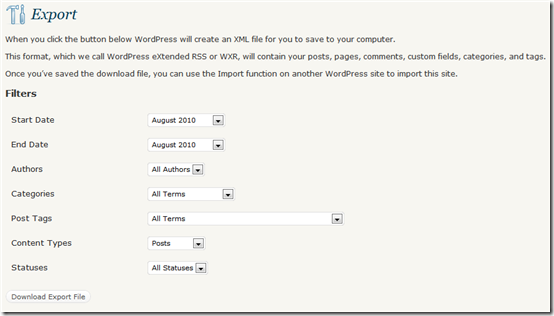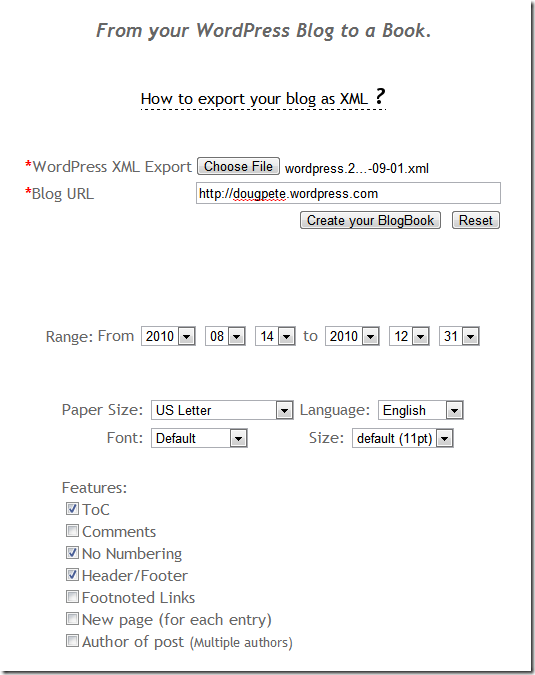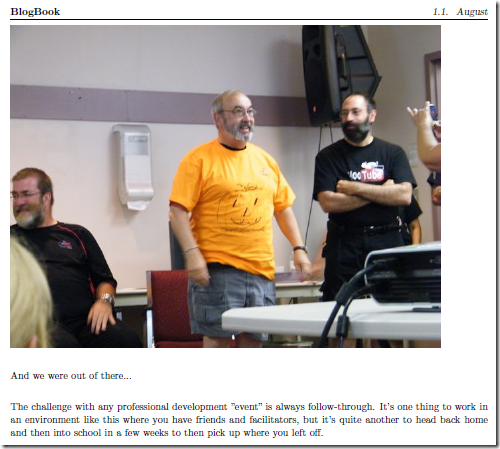As the school year comes to the end, I thought that I would share the post below. It’s abot one of my favourite blogging utilities – BlogBooker – and how it’s so useful as things wrap up. It’s a great way to archive a year’s worth of blogging to share with students, parents, post to your classroom wiki – all in the name of backing up and making a record of this year’s work. Plus, it can serve as inspiration for next year’s blogging efforts. There’s nothing like a good example.
As it turns out, when I went looking for this post, I’ve mentioned BlogBooker many times. You can see all the references here.
Here’s the “Post from the Past” that I’d like to bring forward today. The original post is from June 26, 2013.
This is another “Post From The Past” that is very appropriate given that we’re approaching the end of the school year here in Ontario. You and/or your students have been blogging all year. Will you just abandon your efforts? Or, will you make a copy of it to save, use as an example, email to parents, give to students to keep, or use for any other of a myriad of purposes?
BlogBooker is an awesome service. It will take the entire contents of your blog (with a little work) and create a PDF file that you can tuck away or otherwise repurpose so that you don’t lose the effort that went into it’s creation. Here from August 22, 2010 is my post “To do more with your blog“.
Hey, you might even want to turn it into “A Flipping Blog“!
======
Yesterday, George Couros asked for a little input through a Twitter message.
My first reaction what that this might be a step backward in the goal of integrating technology for students. After all, if you have a blog, why would you want to revert to a newsletter format? In its simplest format, it could be a paper document that’s sent home to parents.
But then, I started thinking. There are a lot of reasons why it might be desirable to have a blog in newsletter format. Some that immediately come to mind are:
- Not every parent has internet at home for any of a wide variety of reasons;
- The blog might be private with only student access for privacy concerns;
- Access to blogs might be blocked at school but the teacher blogs from home;
- The principal of the school wishes to have paper generated for whatever reason;
- The blog might be part of a project where a culminating document detailing everything is desired;
- The blog is reset for a new year or new unit or
- You just want a copy of your blog in another format …
Yes, upon further review, I can see where there may be reasons for a blog to be in a different format for a specific use.
I think that the other thing about a solution would be that it needs to be easily re-purposed by a teacher to the differing format. Typically, blogs have considerable effort in their creation and who has the time for yet another creation?
I then thought about BlogBooker. I had blogged about its use in the past here. At that point, I was thinking about using it as a way to create a backup for a blog or a permanent record of thoughts. I’ve actually used it to create a couple of backups of my entire blog. It works very easily when I want a book of everything (including the graphics and pictures that I embed in posts) but would it do the trick on a more flexible basis?
The procedure is pretty easy.
- Export your blog content from your blog (it’s in XML format but most people wouldn’t care or need to care about the format);
- Upload the content to Blogbooker;
- Wait a minute of two;
- Download your book in PDF format.
Conceivably that PDF could be filed away for posterity or printed if it absolutely had to be.
But, what about content of a shorter duration? I never really paid close enough attention when I did the steps above to see if it was customizable. So, I went through the process and actually paid attention this time.
Now, I use WordPress as my host and so went to my dashboard and the export tool.
Well, I’ll be. There are configuration options! I can set a start and end date. In terms of the content, I could choose just the posts or all content. I’m thinking that just the posts would suit my needs best. Click on the “Download Export File” button and it’s on my hard drive. That was easy. The only limitation that I could see was that the export was done month by month. Probably not a big issue as the newsletter might well be a monthly one.
Now, it’s over to BlogBooker.
Step one is to let BlogBooker know what type of Blog this comes from. It supports WordPress, Blogger, and LiveJournal. That’s a good selection. Then comes the WOW moment. There are a huge collection of formatting options for the output. The preferences are customizable for any purpose. I elected NOT to use “Footnoted Links” because my blog entries have a great deal of links in them. If the ultimate goal is to send it to a printer, then you’re not going to want each entry on a separate page, I hope.
Give BlogBooker a few moments and voila! There’s the nicely formatted book in PDF format that you can download or view right in your browser. I really like the fact that I could customize further the start/finish dates of the publication and the images are intact. I really like the concept and it was so simple to do. Plus, the headers and footers put a nice finishing touch on the whole product.
It even includes pumpkin shirts!
Thanks, George, for the question and the opportunity for me to revisit this very powerful application. Thanks, also to Aviva and Peter for keeping the conversation going.





Please share your thoughts here. I’d enjoy reading them.